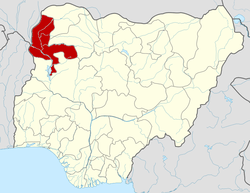Kebbi State
| Kebbi | |
|---|---|
| State | |
| Nickname(s): Land of Equity | |
 Location of Kebbi State in Nigeria | |
| Coordinates: 11°30′N 4°00′E / 11.500°N 4.000°ECoordinates: 11°30′N 4°00′E / 11.500°N 4.000°E | |
| Country |
|
| Date created | 27 August 1991 |
| Capital | Birnin Kebbi |
| Government | |
| • Governor (List) | Abubakar Atiku Bagudu (APC) |
| Area | |
| • Total | 36,800 km2 (14,200 sq mi) |
| Area rank | 10th of 36 |
| Population (1991 census) | |
| • Total | 2,062,226 |
| • Estimate (2005) | 3,630,931 |
| • Rank | 22nd of 36 |
| • Density | 56/km2 (150/sq mi) |
| Demonym(s) | Kebbian |
| GDP (PPP) | |
| • Year | 2007 |
| • Total | $3.29 billion[1] |
| • Per capita | $993[1] |
| Time zone | WAT (UTC+01) |
| ISO 3166 code | NG-KE |
| Website | services.gov.ng/kebbi |
Kebbi is a state in north-western Nigeria with its capital at Birnin Kebbi. The state was created out of a part of Sokoto State in 1991. Kebbi State is bordered by Sokoto State, Niger State, Zamfara State, Dosso Region in the Republic of Niger and the nation of Benin. It has a total area of 36,800 km².
History
Kebbi is traditionally considered by Sarki mythology as the homeland of the Banza bakwai states and Hausa Kingdoms. According to recent research based on local oral traditions, king lists and on the Kebbi chronicle, the state of Kebbi was founded towards 600 BCE by refugees of the Assyrian empire conquered by Babylonian and Median forces in 612 BCE. A major local event was the conquest by Songhai in the second half of the fifteenth century CE.[2]
Subdivisions
Kebbi state was created out of the former Sokoto State on 17 August 1991. The State has a total population of 3,137,989 people as projected from the 1991 census, within 21 Local Government areas.
The state has Sudan and sahel-savannah. The southern part is generally rocky with the Niger River traversing the state from Benin to Ngaski LGA. The northern part of the state is sandy with the Rima River passing through Argungu to Bagudo LGA where it empties into the Niger. Agriculture is the main occupation of the people especially in rural areas, Crops produced are mainly grains; animal rearing and fishing are also common. Christianity and Islam are the dominant religions of the people. There are 225 political wards, 3000 settlements and 1036 hard to reach settlements in the 21 Local Government Areas in the State.
Local Government Areas
Kebbi State consists of 21 Local Government Areas (LGAs), four emirate councils (Gwandu, Argungu, Yauri and Zuru), and 35 districts. The LGAs are as follows:
Demographics
Kebbi State is mainly populated by Hausa people, with some members of Lelna, Bussawa, Dukawa, Kambari and Kamuku ethnic communities.
The people of Kebbi are predominantly Muslims who practice Islam as a religion.
Bibliography
- Harris, P. G.: Sokoto Provincial Gazetteer, Sokoto 1938 [Cyclostyled].
- Hogben, S. J. and A. Kirk-Greene: The Emirates of Northern Nigeria, London 1966.
- Lange, Dierk: "An Assyrian successor state in West Africa: The ancestral kings of Kebbi as ancient Near Eastern rulers", Anthropos, 104, 2 (2009), 359-382.
See also
References
- 1 2 "C-GIDD (Canback Global Income Distribution Database)". Canback Dangel. Retrieved 2008-08-20.
- ↑ D. Lange, "Successor state", Anthropos, 104, 2 (2009), 366-380.